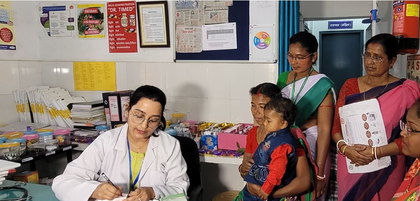WHO report urges countries to invest more in primary health care to tackle future pandemics
By IANS | Updated: October 14, 2025 14:50 IST2025-10-14T14:48:32+5:302025-10-14T14:50:20+5:30
New Delhi, Oct 14 Scaling up investment in primary health care is critical to ensure local and global ...

WHO report urges countries to invest more in primary health care to tackle future pandemics
New Delhi, Oct 14 Scaling up investment in primary health care is critical to ensure local and global communities are ready to prevent and respond to the next pandemic, said a new report by the World Health Organization (WHO), on Tuesday.
The Global Preparedness Monitoring Board (GPMB) report, released during the ongoing World Health Summit held in Berlin, emphasised the urgent need to transform global health security in a world that is experiencing new volatility, uncertainty, complexity, and ambiguity while still recovering from the Covid-19 pandemic.
Calling for a transformative shift in pandemic preparedness, it also urged countries to invest more in real-time risk assessment and international cooperation.
The GPMB, established in 2018 following the West Africa Ebola epidemic, monitors the state of the world’s preparedness for pandemics and other health crises. It is an initiative supported by the WHO and the World Bank.
“In our increasingly volatile and uncertain world, real preparedness for pandemics and other health emergencies must be anchored in well-functioning and well-financed primary health care systems,” said Kolinda Grabar-Kitarović, GPMB Co-Chair and former President of Croatia.
“Robust primary health systems reach deep into communities, providing essential health services in peacetime and building the deep trust that is fundamental to an effective health response when crises strike,” Grabar-Kitarović added.
The report urged governments and institutions to adopt a paradigm shift to reset the global health architecture for pandemic preparedness, focusing on three actions: care, measure, and cooperate.
It noted that a shift in “care” is imperative to boost frontline systems through investments in primary health care, closer engagement with communities, and a protected health workforce.
On “measurement,” the report called for establishing a comprehensive pandemic risk monitoring system that tracks threats, vulnerabilities, and preparedness in real time, integrating health, social, economic, and environmental data into clear signals for leaders.
On “cooperation,” the report highlighted the importance of a global health architecture based on the principles of solidarity and equity, and that encourages the ratification, implementation, and financing of the WHO Pandemic Agreement.
Disclaimer: This post has been auto-published from an agency feed without any modifications to the text and has not been reviewed by an editor
Open in app